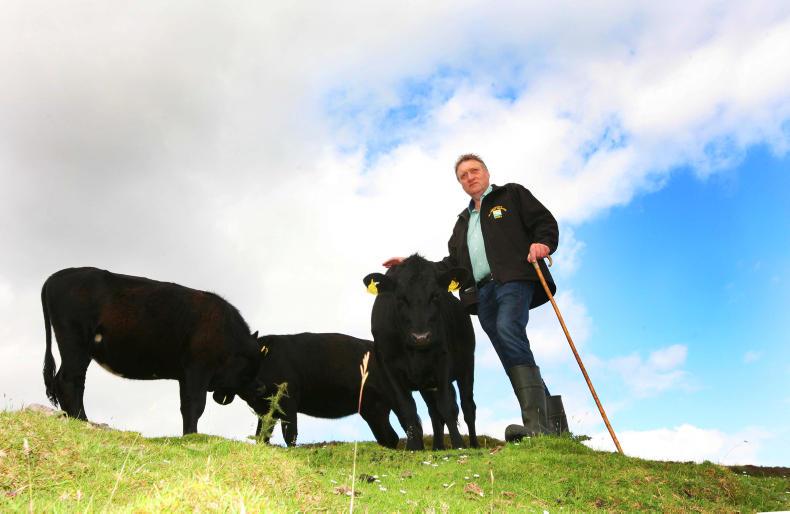Colm O’Donnell farms hill sheep and Angus sucklers in the hills of Co Sligo.
The Monalea Aclare farmer was recently elected president of the Irish Natura and Hill Farmers Association (INHFA) and the group now has about 5,000 members.
Over the past number of months, the association has been calling for payments in the Area of Natural Constraints (ANC) review to reflect the level of constraint on the land, holding a number of packed regional meetings on the review.
The review looks set to be postponed until next year after Ireland applied for an extension.
Speaking to the Irish Farmers Journal, O’Donnell said that INHFA has received confirmation from the European Commission that if a member state were to put a credible case forward for an extension, that they would have to consider it.
 “But as of now the Commission haven’t formally ratified the extension. That’s our understanding.
“But as of now the Commission haven’t formally ratified the extension. That’s our understanding.
“I think it would be fair to say that if some of the member states have supported the Austrian position [to extend the review], that they would find it hard not to grant the extension.
“We would welcome the extension, provided it gives adequate time for consultation.”
However, O’Donnell asked that should it be the case that an extension wasn’t granted, how close Ireland is to completing the mapping out of the new criteria for the review?
Furthermore, he said that mountain sheep grazing areas must be retained as part of the ANC review as a category for payment.
Programme for Government
On the additional €25m announced in the last Budget that would be provided for the ANC scheme, O’Donnell said that that money needs to be targeted.
“The INHFA position would be that that €25m would be targeted to coincide with the review in that the areas with the highest areas of natural constraint should get that money.”
Sheep Welfare Scheme
O’Donnell said that the Sheep Welfare Scheme is high on the priority list of the association.
“It’s important that the €25m allocated annually stays within the sheep sector because currently there’s a potential underspend of €5m a year because of the uptake.
“Our proposal is that the hill sector could actually choose another option or measure [to use up the €5m].
“It would take about €3m approximately to add another measure for the amount of hill sheep that are in the scheme, so it could be done. That would require an amendment to the RDP.”
Appeals mechanism
Meanwhile, the INHFA president said that the association has lost confidence in the whole farm inspection appeals process.
“Beneficiaries of schemes are entitled to a control report, at the time of inspection and to add comment to that report.
We want an independent appeals board on farm inspections
“But Department inspectors clearly didn’t do that and didn’t adhere to the guidelines. We still have members involved in the appeals process.
“We want an independent appeals board on farm inspections.
“At the minute, the only court a farmer has is the High Court. If a farmer wants to appeal the appeals board decision, he has to go to the High Court.
“It’s catered for in the regulations that all beneficiaries are entitled to a control report if it has a negative impact on their BPS application.
“You could have a commonage, for example, under inspection with 20, 30 shareholders. Singling out one shareholder for a control report is not good enough – it needs to go to all beneficiaries.”
CAP reform
The INHFA position on the reform of the Common Agricultural Policy is that currently the maximum level of payment of €150,000 should be at least halved. It also has a range of changes in its CAP submission.
These included changing the reference year to 2019, to ensure as many farmers as possible can benefit.
INHFA also called for:
A direct payment of €150/ha/year for land that is designated.Coupled support: for vulnerable sectors with up to 10% of the budget available. Possible benefactors in Ireland would be suckler cows and sheep.Greening – maintaining the present three greening options with a flat rate payment of approximately €75/ha.The next CAP also must make a National Reserve available for the full duration of the programme, according to the INHFA.
Farmers Charter of Rights
Furthermore, O’Donnell believes that the Farmers Charter of Rights should become a mandatory part of the terms and conditions when farmers are applying for schemes.
“It doesn’t have any statutory standing at the moment but it is not being adhered to. It is not just on time levels with payments, the whole inspections side of it is part of the charter as well.”
Brexit
Meanwhile, when it comes to the UK leaving the European Union, O’Donnell said that there is joint responsibility on Ireland’s MEPs and elected representatives to look for a special CAP deal for Ireland in light of the impact that a hard border could have on Irish agriculture.
“We are dependent on exports to Britain. The Irish allocation of the CAP budget should increase because of us being an isolated island on the periphery of Europe.”
Colm O’Donnell farms hill sheep and Angus sucklers in the hills of Co Sligo.
The Monalea Aclare farmer was recently elected president of the Irish Natura and Hill Farmers Association (INHFA) and the group now has about 5,000 members.
Over the past number of months, the association has been calling for payments in the Area of Natural Constraints (ANC) review to reflect the level of constraint on the land, holding a number of packed regional meetings on the review.
The review looks set to be postponed until next year after Ireland applied for an extension.
Speaking to the Irish Farmers Journal, O’Donnell said that INHFA has received confirmation from the European Commission that if a member state were to put a credible case forward for an extension, that they would have to consider it.
 “But as of now the Commission haven’t formally ratified the extension. That’s our understanding.
“But as of now the Commission haven’t formally ratified the extension. That’s our understanding.
“I think it would be fair to say that if some of the member states have supported the Austrian position [to extend the review], that they would find it hard not to grant the extension.
“We would welcome the extension, provided it gives adequate time for consultation.”
However, O’Donnell asked that should it be the case that an extension wasn’t granted, how close Ireland is to completing the mapping out of the new criteria for the review?
Furthermore, he said that mountain sheep grazing areas must be retained as part of the ANC review as a category for payment.
Programme for Government
On the additional €25m announced in the last Budget that would be provided for the ANC scheme, O’Donnell said that that money needs to be targeted.
“The INHFA position would be that that €25m would be targeted to coincide with the review in that the areas with the highest areas of natural constraint should get that money.”
Sheep Welfare Scheme
O’Donnell said that the Sheep Welfare Scheme is high on the priority list of the association.
“It’s important that the €25m allocated annually stays within the sheep sector because currently there’s a potential underspend of €5m a year because of the uptake.
“Our proposal is that the hill sector could actually choose another option or measure [to use up the €5m].
“It would take about €3m approximately to add another measure for the amount of hill sheep that are in the scheme, so it could be done. That would require an amendment to the RDP.”
Appeals mechanism
Meanwhile, the INHFA president said that the association has lost confidence in the whole farm inspection appeals process.
“Beneficiaries of schemes are entitled to a control report, at the time of inspection and to add comment to that report.
We want an independent appeals board on farm inspections
“But Department inspectors clearly didn’t do that and didn’t adhere to the guidelines. We still have members involved in the appeals process.
“We want an independent appeals board on farm inspections.
“At the minute, the only court a farmer has is the High Court. If a farmer wants to appeal the appeals board decision, he has to go to the High Court.
“It’s catered for in the regulations that all beneficiaries are entitled to a control report if it has a negative impact on their BPS application.
“You could have a commonage, for example, under inspection with 20, 30 shareholders. Singling out one shareholder for a control report is not good enough – it needs to go to all beneficiaries.”
CAP reform
The INHFA position on the reform of the Common Agricultural Policy is that currently the maximum level of payment of €150,000 should be at least halved. It also has a range of changes in its CAP submission.
These included changing the reference year to 2019, to ensure as many farmers as possible can benefit.
INHFA also called for:
A direct payment of €150/ha/year for land that is designated.Coupled support: for vulnerable sectors with up to 10% of the budget available. Possible benefactors in Ireland would be suckler cows and sheep.Greening – maintaining the present three greening options with a flat rate payment of approximately €75/ha.The next CAP also must make a National Reserve available for the full duration of the programme, according to the INHFA.
Farmers Charter of Rights
Furthermore, O’Donnell believes that the Farmers Charter of Rights should become a mandatory part of the terms and conditions when farmers are applying for schemes.
“It doesn’t have any statutory standing at the moment but it is not being adhered to. It is not just on time levels with payments, the whole inspections side of it is part of the charter as well.”
Brexit
Meanwhile, when it comes to the UK leaving the European Union, O’Donnell said that there is joint responsibility on Ireland’s MEPs and elected representatives to look for a special CAP deal for Ireland in light of the impact that a hard border could have on Irish agriculture.
“We are dependent on exports to Britain. The Irish allocation of the CAP budget should increase because of us being an isolated island on the periphery of Europe.”
 “But as of now the Commission haven’t formally ratified the extension. That’s our understanding.
“But as of now the Commission haven’t formally ratified the extension. That’s our understanding. 





 This is a subscriber-only article
This is a subscriber-only article











SHARING OPTIONS: